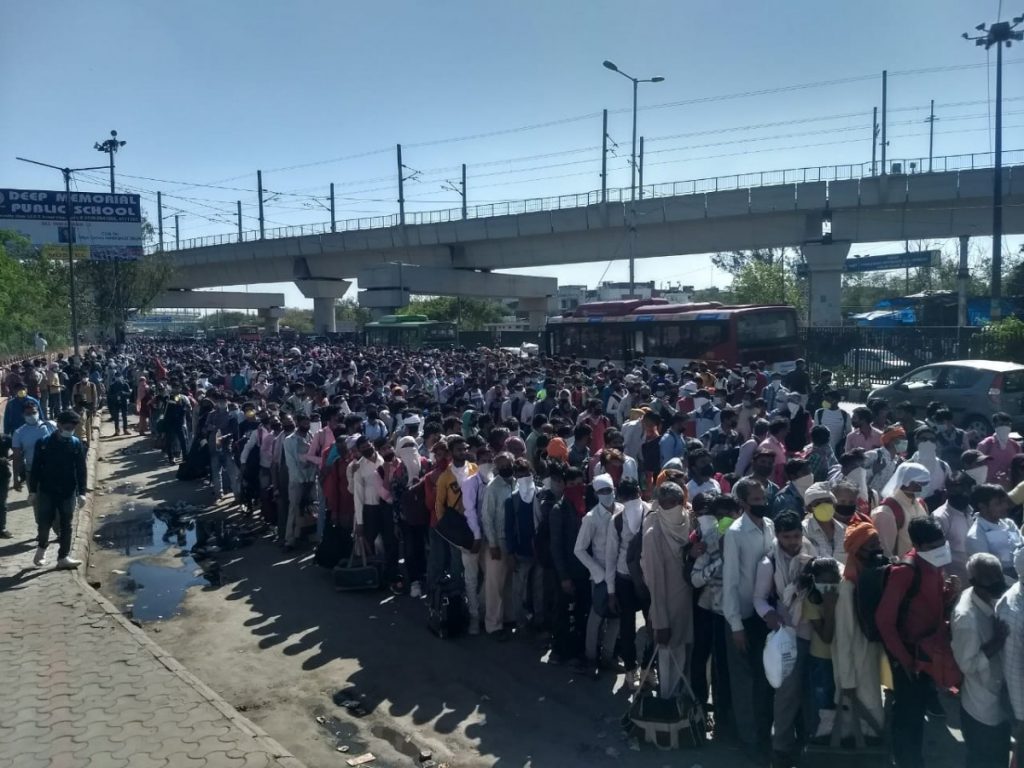New Delhi: The Union Ministry of Health and Family Welfare on Thursday wrote to all the states and union territories to take necessary action on the directions of the Supreme Court in dealing with the grievances of migrant labourers. It also urged the governments and administrations to use the services of community leaders, counsellors and volunteers along with the police to supervise the welfare activities of the migrants, to understand their fears and to treat them with kindness.
The order comes in the wake of an incident in which disinfectant was sprayed on migrant workers walking back to their homes in Bareilly, Uttar Pradesh. The inhumane treatment meted out to the poor labourers had raised questions about the way the governments are handling the situation.
The Centre was criticised for not giving time for migrant labourers to head back to their native places before the nationwide lockdown was imposed and transport facilities were shut off in place before making arrangements for their food and stay. Similarly, the states were found to have not made enough arrangements for providing them cooked food and rations to migrants, most of whom work as daily wage labourers and have little savings.
Also Read: What Happens to the Wives of Male Migrant Workers, Who Run Entire Households in Villages?
The ministry has, through its secretary, urged the states and UTs to note that the Supreme Court directed that the migrant workers who have been kept in relief camps and shelter homes should be provided adequate medical facilities besides proper arrangements for food, clean drinking water and sanitation.
‘Engage counsellors, group leaders volunteers to prevent anxiety, fears’
Also, the ministry said trained counsellors or community group leaders belonging to all faiths will visit the relief camps or shelter homes and deal with any consternation that the migrants might be going through. “This shall be done in all the relief camps/shelter homes wherever migrants are located in the country,” it directed.
Further, the apex court, the ministry letter said, demanded that the anxiety and fear of the migrants should be understood by the police and other authorities and they should deal with them in a humane manner.
As such, the states and UTs have been told to engage volunteers along with the police to supervise the welfare activities of the migrants, to understand their fears and to treat them with kindness.
On Monday, the ministry also issued an advisory on dealing with the migrant workers and their families. It had covered the aspects of providing them quarantine facilities while they were at their local place, in transit to their native place, or if they have reached their native place.

Migrant workers outside the Anand Vihar Bus Terminal. Photo: Anuj Srivas
‘No evacuation by employer, landlord’
This advisory stated that migrant workers from peri-urban and rural parts of the country who migrate to large cities constitute a sizable segment of urban population across the country. During the outbreak of a communicable disease or social distancing measures, it noted that they tend to return to their homes.
With a similar situation unfolding now, the advisory said the Ministry of Home Affairs (MHA) has already made it clear that “the migrant workers will remain at their regular place of work or local residence within the city. They will not be evacuated either by their employer/landlord.”
As for the migrant workers who may have reached bus stations or railway stations or any other place within the city of their local residence, the advisory has called for maintaining their personal records, and thermal screening by district health teams.
For those having fever, it has suggested further checks for symptoms suggestive of COVID-19 and sending them to hospitals designated for isolation and treatment. Special quarantine facilities have also been recommended for those above 60 years of age and having co-morbidities. For all others, home quarantine for 14 days has been advised.
Migrants on roads to be lodged in quarantine centres
For the migrant workers who may be stuck on the way between their local residence and their native place, the advisory has called for setting up quarantine centres. It also stated that in these centres, the personal records of the migrant workers would be recorded, thermal screening done and those having fever will be interviewed by the health team. Here too, people will be checked for symptoms of COVID-19; and where there is history to suggest contact with a suspected or confirmed case of COVID-19, the person would be sent to a designated hospital for isolation and testing.
The advisory also spelt out that at all quarantine facilities, a record of migrant workers should be maintained; the contact number of the administrator would be displayed for reporting of grievances; and all basic amenities would be provided. It also called for allowing such persons to remain in contact with their families over the phone during the 14-day period of quarantine to avoid anxiety and stress.
Technical actions such as daily medical examination of all those kept under quarantine; providing the migrant workers with triple-layer medical mask; sanitising them, teaching them how to dispose of masks and wash their hands frequently, and how to follow respiratory etiquettes have also been spelt out in the advisory.
The advisory also called for special care while dealing with vulnerable groups including children, pregnant women, elderlies and those with co-morbidities. It also lays down that psycho-social teams should visit quarantine facilities; and an ambulance be stationed there to attend to any medical emergency.
Workers who have reached native places to be monitored
In the case of migrant workers who have reached their destination, the advisory said they will be identified by the district administration and be monitored as per the Integrated Disease Surveillance Project at their residence. They would be checked for fever and if their history suggests contact with a suspect/confirmed case of COVID-19 they would be referred to the designated hospital.
For all others, 14-day home quarantine has been mandated.
